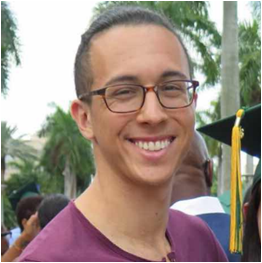Written by Eduardo Baptista (2017 Yenching Scholar)
A few weeks ago, the first sixteen members of Yenching Academy's third cohort arrived at Beida. They are all bound by a shared inexperience in the study of Mandarin, and their past forays and perspectives on language study expose an even deeper bond: a profound willingness to learn. This mentality reflects the words of Associate Dean John Holden: “Anybody who tries to come to grips with China, a country with a very rich civilization and a long history [has] to be humble in recognizing that there are things you will get wrong.”
"Getting things wrong" has defined these first two weeks in Beida's Chinese Language Summer School. Tone-deaf pronunciation of Mandarin words has led many a laoshi or shifu to furrow their eyebrows in displeasure or confusion. Poor knowledge of characters has turned simple apps into terrifying obstacles. Gone is the eloquence these scholars enjoy in their native languages; in comes the child-like pointing when ordering food at the canteen.
Slowly but surely, all sixteen students are making progress. Tone changes start to become sharper as their ears become accustomed to the music of Mandarin. Greetings, responses, and fillers such as zai4jian4, dui4, and na4ge start to become second nature. Some have even applied two weeks of learning out in the big, wide world—catching cabs, ordering food, and asking strangers for directions.
Mandarin demands hard work—perhaps more so than many other languages—but these Yenchingers have stepped up to the challenge. Let's see why!

Blake Mandell | USA
From Day One, Blake has been leading the charge for YCA's Chinese-learning novices. He has converted many of his fellow scholars to cutting-edge Mandarin learning apps such as Skritter, and has been churning out new words at an impressive rate, earning him the compliment of "noisy" from his laoshi. Blake is grateful for the patience people have shown him here in Beijing as he mumbles phrases and looks up words in the dictionary. Attracted to the most difficult part of studying Mandarin—writing—Blake enjoys learning about Chinese culture through the concepts contained in characters. This is illustrated by his favourite word: 安 (an1), meaning "safety," which he notes makes sense given that the character is a woman under a roof, reflective of China's past gender dynamics. With such a creative approach to Mandarin, Blake will no doubt impress countless Beida students throughout this coming year.

Asmod Kharki | Nepal
Hailing from China’s neighbouring country of Nepal, Asmod is a diligent student of Mandarin, proven by a mid-morning sprint to endure a 听写 (ting1xie3, or"dictation") after a two-hour residence registration ordeal. Like many young Nepalese, Asmod is naturally bilingual, having become fluent in Hindi by watching movies in that language. Nepali and Hindi script are quite similar, and Asmod comments that learning Hindi was easy compared to these first experiences with Mandarin. He explains that compared to Nepali’s flat tone, Mandarin’s incessant tonal changes are “like nothing I have encountered before.” Nevertheless, he has grown fond of the consecutive, "slashing" fourth tones in 再见 (zai4jian4, or "see you again")—a sound that contrasts remarkably with the more soft-sounding corresponding phrase in Nepali: Pheri Bhetaula. Rocking shirts with inspiring Lu Xun quotes since Day One, Asmod's love for 中文 will no doubt continue to grow.

Amna Sarwer | Pakistan
An avid reader of the ground-breaking writings of Michel Foucault and other post-colonial theorists, Amna is very much aware of the connection between language and power—a connection that has shaped her decision to study Mandarin. In light of the recent CPEC negotiations—part of the One Belt Road One Road Initiative—Amna observes that a surge in investment has created “dire need” for Pakistani civil servants like herself to learn Chinese and push forward the ever-growing partnerships between the two nation-states. At the same time, Amna has a deep personal appreciation for languages, especially Mandarin. She describes it as “music to my ears.” Such an aesthetic conception of language is reflected in her favourite words: 漂亮 (piao4liang4, or "pretty") in Mandarin, and Sagafat ("civilization") in Urdu.

Mayra Zamiar | Pakistan
Working with the Pakistani government in the Ministry of Planning Development and Reform, Maira's interest in Mandarin emerged in reaction to recent developments in Pakistan-China relations. Boasting an impressive trilingual portfolio of Arabic, Urdu, and English, Maira is no stranger to learning new languages. While she was nervous at the beginning of her Mandarin language learning journey, she has begun taking pleasure in the similarities between Mandarin and her regional language of Punjabi, such as the pronunciations for "p" and "t". However, she also notes the difficulty of mastering the tonal quality of the language. Maira’s three favourite words in Arabic, Urdu and Chinese all mean "thank you": Shukran, Shukriya, and Xie4Xie4 all start with a "sh"-like sound.

Patrick William Dancer | USA
Noting the difficulty of understanding Chinese politics without a “heavy dose of U.S. perspective” while in the United States, Patrick hopes that learning Mandarin can help him obtain an understanding of China that is more detailed, nuanced, and “unfiltered.” Patrick has also studied Spanish and French. His Spanish is only good enough to read billboards, but French study led him to think about the logic underlying a new language. He says that learning any Latin-root language “is nothing compared to Mandarin.” However, with a few years of Ancient Greek under his belt, Patrick does not fear the challenges that learning a new language entails.

Miles Omer Graham | USA
Do not be fooled by Mr. Graham's use of cliché quotations like “learning a new language is like trying a new cuisine for the first time.” Having studied Japanese for 4 years, Miles is serious about language learning. His experience with kanji has allowed him to jump head-first into Mandarin. Miles notes the similarities between measure words, grammar structures, and questions markers between Mandarin and Japanese. He looks forward to more such discoveries. Miles is a permanent optimist (evidenced by the fact that he completed a marathon!). He observes that in spite of Mandarin’s difficult tones, its lack of conjugation makes it easier than Japanese in some ways. The iron determination that will raise him above the Great Wall of Mandarin is reflected in his favorite words in Chinese (加油, or jia1you2) and Japanese (頑張って , organbatte), which can both be translated as "let's go!"

Theresa Kennedy | USA
Despite a middle school romance with Mandarin that didn't last, Theresa has given Putonghua's tonal temperament another chance, and happily notes that words are coming back to her. Since middle school, Theresa has acquired a wealth of language learning experience, having studied Spanish, Portuguese, and Quechua. She takes pleasure in noticing certain similarities between Quechua and Chinese, such as the existence of different cadences and tones. Theresa is interested in the singularity of certain ideas within a particular language, such as her favourite word in Spanish, cosmovision (which can be roughly translated as "world view," but not quite). Theresa is hoping that her renewed relationship with Mandarin will have a happy ending.

Ravish Bhatia | India
Ravish has worked close to the India-China border in Natula, where the two countries are presently at a standoff. He is passionate about helping to resolve this problem, and has very practical reasons for learning Mandarin. Ravish notes that he alternatingly feels either “extremely happy or very unconfident” about his language learning, and that “ups and down are what learning is about.” Hindi has been a defining component in the first twenty years of his life, and he has high hopes that Mandarin will shape his learning for the next twenty years. Three years out of school, he is grateful for the grey cells that Mandarin has awakened. This is evident in his favourite Chinese word, 谢谢(xie4xie4), meaning “thank you.” Guided by teachings like the Vasudaiva Kutumbakam (the famous Sanskrit verse meaning “the world is a family”), Ravish is passionate about learning Mandarin.